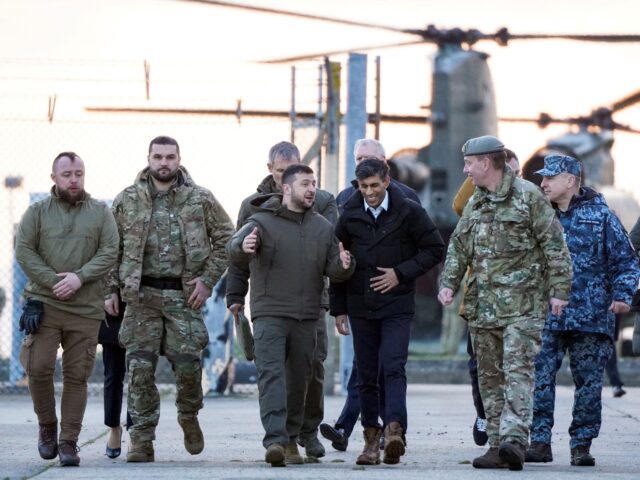Prime Minister Rishi Sunak has suggested that British long-range missiles, which the Ukrainians say they want to use to launch an offensive against occupied Crimea, could be sent to Ukraine as the war heats up one year on since the invasion. Meanwhile, Zelensky warns that Russia intends to invade EU-member-candidate Moldova next.
Following Rishi Sunak’s declaration that “nothing is off the table” on military aid to Ukraine, Whitehall is now actively considering sending long-range missiles to the war-torn country in addition to potential fighter jets. Speaking from the Lulworth army camp in Dorset on Wednesday, the prime minister said: “Probably the most crucial capability right now is main battle tanks, which we led on, but also those long-range missiles.
“In all the talking we’ve done and the planning for how we can have the sight of victory in the battlefield and make progress, it requires long-range missiles,” Sunak continued. “Currently the range is not there. That’s the conversation we’ve been having and again we hope Britain can lead.”
According a report from The Times of London, the two types of missiles being considered are the 150-mile range truck or ship-mounted Harpoon high-explosive anti-ship missiles and the deep penetration blast Storm Shadow [general purpose cruise missile] with a range of 350 miles.
The paper notes “Ukrainian defence sources” are clear they want to use the missiles to strike Crimea, Ukrainian territory that was annexed by Russia in 2014.
Publicly, President Volodymyr Zelensky said this week that Western missiles would be used to strike “deep in the occupied territories”. Moscow’s military supply lines in Ukraine would also likely be a chief target, yet it is unclear whether direct strikes — though possible — would occur against the Russian mainland.
Downing Street confirmed to the broadsheet that an offer was made to supply Kyiv (Kiev) with “longer-range capabilities” that would “disrupt Russia’s ability to continually target Ukraine’s civilian and critical national infrastructure”.
The shipment of missiles would be another expensive bill for the British taxpayer, with the UK government having already sent nearly £4 billion to Ukraine in the form of military, humanitarian, and economic aid since last years invasion. The UK has only been eclipsed by the United States in terms of military aid with £2.3 billion worth of armaments sent in 2022. Just one Harpoon missile comes at a cost of £1.2 million, while Storm Shadows run to £2.2 million a pop.
As has been the case since the outset under former Prime Minister Boris Johnson, the government of the United Kingdom appears to be the most interested in escalating its own involvement in the conflict.
In a demonstration of the military ties between the two countries, Prime Minister Sunak personally appeared this week with Zelensky in front of tanks and soldiers at a British army camp in Dorset where Ukrainian soldiers are currently being trained.
In the London Declaration signed by Zelensky and Sunak on Wednesday, which reaffirmed Britain’s commitment to seeing Ukraine join the NATO military alliance — a ‘red line’ for the Kremlin, they say — the British government said: “The UK has continued to lead the way in support for Ukraine to defend itself including anti-tank weapons and tanks. Our military support to Ukraine is enduring. UK support will continue to contribute across all three domains; Land, Air, Sea.”
Following his trip to London and Dorset, the diplomatic trip saw Zelensky touch down in Paris for a meeting with President Macron and German Chancellor Olaf Scholz. Finally, he landed in the de-facto EU capital of Brussels, making pleas along the way for heavier weaponry from West, including for warplanes and missiles ahead of a much-discussed potential Russian Spring offensive. Stressing the urgency of his message, the Ukrainian leader told the EU Council that Moscow is allegedly planning to “destroy” and seize the former Soviet republic of Moldova, which like Ukraine is currently a candidate to join the European Union.
In contrast to the UK, which is much less reliant on Russian energy, Macron and the German chancellor shied away from the idea of sending in fighter jets or long range missiles — despite both committing to sending main battle tanks to the conflict zone.
Even with the apparent hesitancy in Paris or Berlin to commit to sending military planes to Ukraine, during Zelensky’s trip there was little mention of the prospect of peace negotiations to end the fighting, which has been broadly ongoing for a decade as a part of the Russo-Ukrainian War, dramatically escalated over the past year, with large loss of life, and potential for drawing Russia and NATO into direct conflict.
Alone among leaders in Brussels, Hungarian Prime Minister Viktor, who drew criticism for not clapping for President Zelensky as he arrived for a “family photo” at the EU Council — though he later shook his hand — has been one of the few major Western figures, alongside former President Donald Trump, to continuously call for peace.
Writing on social media, Orbán wrote on Wednesday that his country will continue to “provide humanitarian and financial support to Ukraine,” but added: “We support an immediate ceasefire in order to prevent the further loss of human lives. Hungary belongs to the peace camp!”
Follow Kurt Zindulka on Twitter here @KurtZindulka

COMMENTS
Please let us know if you're having issues with commenting.